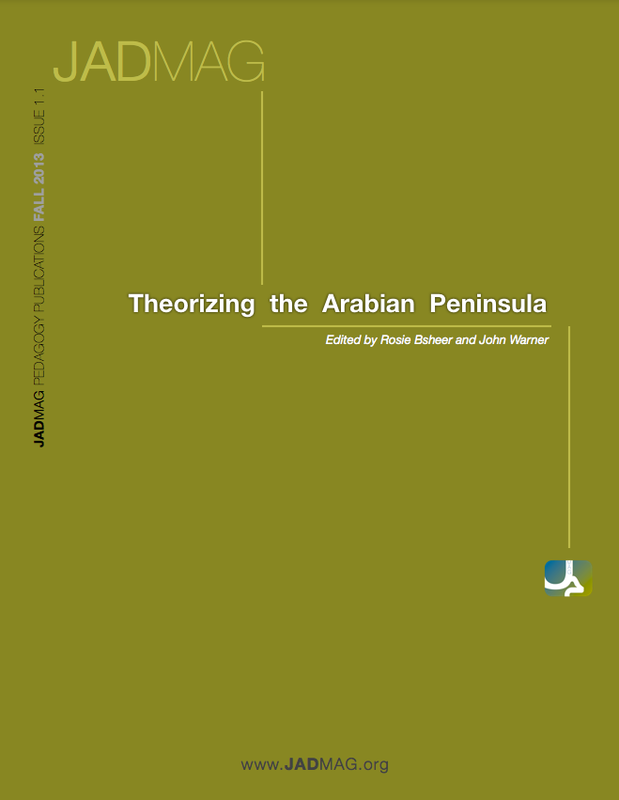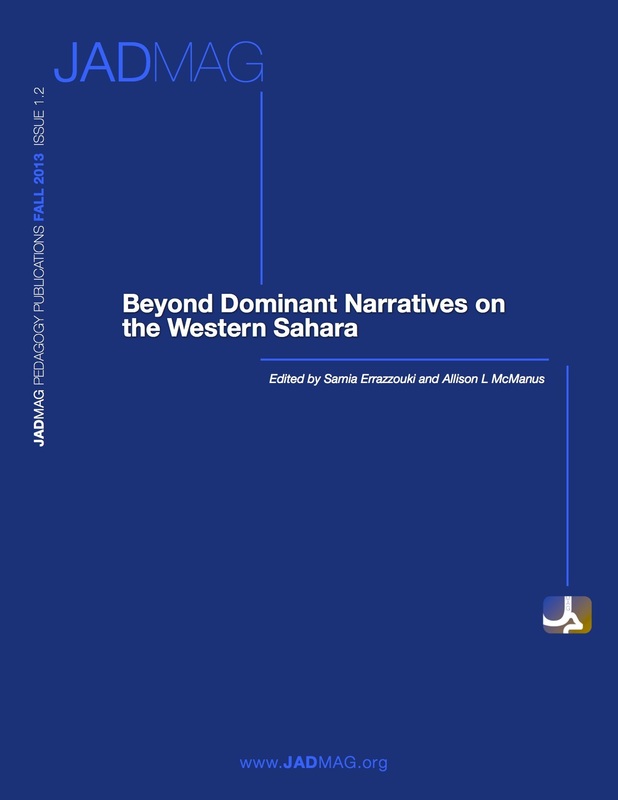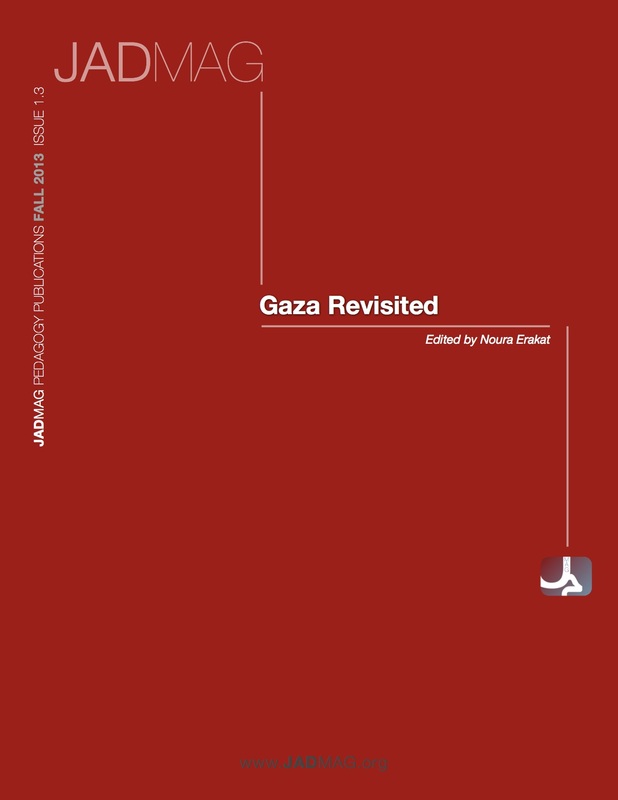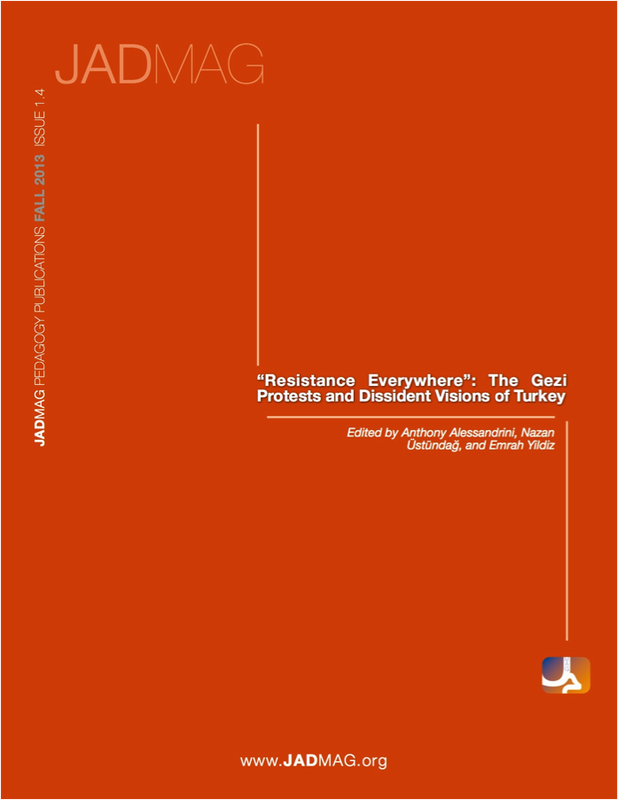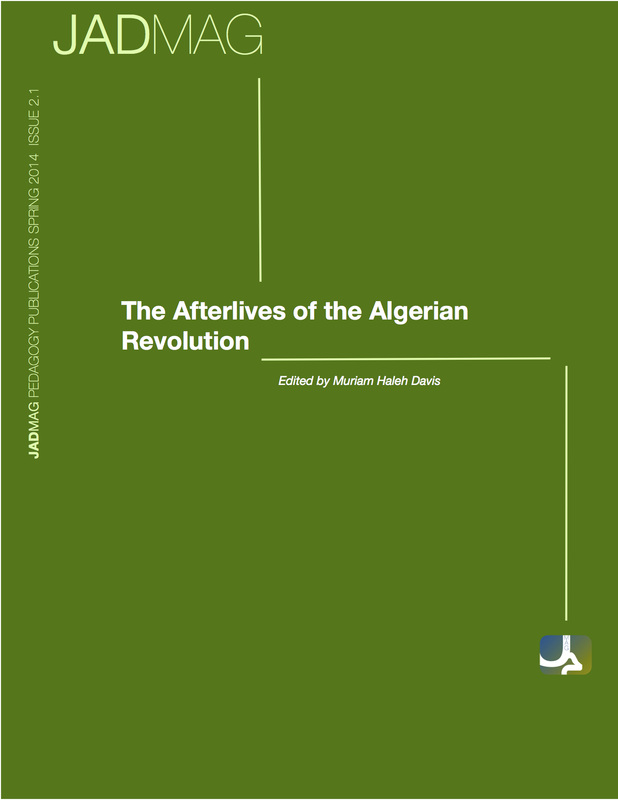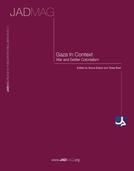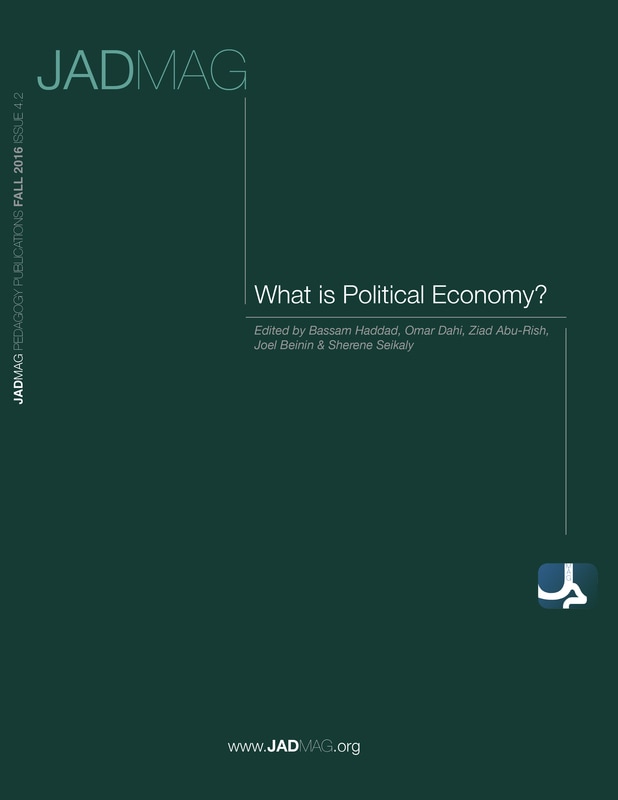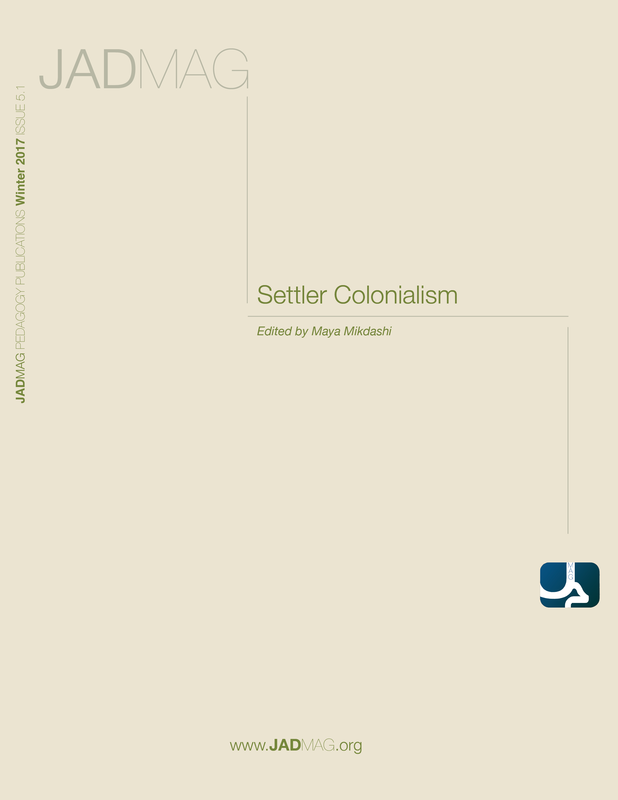Thematic Issues
From its beginnings, JadMag has published individual thematic issues that focus on a particular topics in Middle East Studies and provide a wealth of resources on the subject matter. In addition to Seasonal JadMags, we will continue to publish thematic JadMag issues on a semi-regular basis. Each issue includes a curated collection of incisive articles, and while intended for the classroom they have enjoyed a much broader readership. All JadMag issues are accompanied by a "Teaching Guide" that is available to educators upon request. Educators may receive exam copies by signing up to TEN (TADWEEN EDUCATORS NETWORK).
|
Theorizing the Arabian Peninsula
Edited by Rosie Bsheer and John Warner Despite the sophisticated, critical, and oft-politically engaged literature emerging from and about the Arabian Peninsula the region remains marginalized, in multiple ways, within academic and popular analyses. Theorizing the Arabian Peninsula addresses the ways in which frameworks of knowledge production have not only obscured social realities there, but also contributed to their construction. While our roundtable contributors--activists, journalists, artists, and scholars such as Toby Jones, Adam Hanieh, Neha Vora, and others--approach this project from a number of different disciplinary perspectives and theoretical standpoints, several key themes surface from their critical engagements. The challenge for us, here, is to reconceptualize our objects of analysis to illuminate these power relations and the multiple ways in which they have effected far-reaching transformations of the political, cultural, and material infrastructures of everyday life in the Arabian Peninsula. Approaching knowledge, space, identity, economy, and the political as contested and historically constituted—as the contributors to this roundtable urge us to—thus serves to relocate the peninsula within broader circuits of power, capital, labor, migration, and religion, from which they have long been analytically severed. Beyond Dominant Narratives on the Western Sahara Edited by Samia Errazzouki and Allison L. McManus Since the mid-twentieth century, the Western Sahara conflict has witnessed the brutal repression of activists and numerous other human rights violations against the Sahrawi people. As a result, it has caused the disruption of untold families while incurring extremely high costs for the UN in attempts to maintain stability through humanitarian aid, peace-keeping missions, and facilitating numerous failed dialogues between the parties. To make better sense of the long, complex, and largely marginalized conflict, this pedagogy publication offers a comprehensive, multidisciplinary view of the Western Saharan conflict and the discourses surrounding it. Contributors include Stephen Zunes who sheds light on Morocco’s policies towards the territory and its people, including human rights abuses and policies of settlement; John Entelis who explores the Western Sahara’s significance for the region; Aboubakr Jamaï and Ali Anouzla who underscore the intensification of the call for self-determination; Allison L. McManus who places the conflict in a global context, examining the role of the United Nations; Samia Errazzouki who examines the discourse surrounding the conflict as a political tool that comes at the expense of the Sahrawi population; and Andrew McConnell whose photo-essay offers a unique perspective of life in the refugee camps. Gaza Revisited Edited by Noura Erakat In November 2012, Israel began an aerial bombing campaign against the Gaza Strip that lasted eight gruesome days. Even in its first hours, and before its full magnitude was known, the military campaign sparked urgency amongst observers because of the memory it evoked. In winter 2008/09, Israel conducted a twenty-two day military offensive against the besieged territory. The offensive, infamously known as Operation Cast Lead, killed some 1,300 Palestinians including 280 children, and destroyed twenty-nine schools, sixty police stations, thirty mosques, and 2,400 homes. Thirteen Israelis were killed during the onslaught including three civilians, and four soldiers who were killed by friendly fire. Israel’s military attack unleashed an unprecedented amount of lethal force that raised a slew of moral, political, and legal controversies. Four years later, observers braced themselves for a similar campaign. Operation Pillar of Cloud was not as devastating or long-lasting as its most recent predecessor, but it marked an equally significant juncture in the history of the Palestinian-Israeli conflict. “Resistance Everywhere:” The Gezi Protests and Dissident Visions of Turkey Edited by Anthony Alessandrini, Nazan Üstündağ, and Emrah Yildiz This collection focuses on the Gezi Park protests, which erupted in late May and led to ongoing nation-wide resistance in opposition to the majority government of Prime Minister Recep Tayyip Erdoğan. This volume, designed specifically for use in the classroom, features articles from Jadaliyya’s coverage of this summer’s events in Turkey, plus a selection of pieces from the previous three years that provide background and context. It provides an introduction to recent events in Turkey, which have already made history. It also works to situate these events in their global and local contexts, contributing to ongoing debates about state-citizen relations, regimes of state control, and forms of dissident and collective political action that continue to generate tectonic transformations throughout the region. The Afterlives of the Algerian Revolution Edited by Muriam Haleh Davis In July 2012, Algeria celebrated its 50th anniversary of independence, which signaled the victory of the FLN (National Liberation Front) over the French army. Despite five decades of Algerian independence, much of the work done on Algeria continues to focus on the colonial period. This pedagogical publication seeks to interrogate Algerian history since 1962 and considers how the revolution unleashed multiple socio-political dynamics that continue to mark contemporary Algeria. These articles demonstrate that the revolution was not merely a historical bookmark, but rather produced repertoires of contestations, ideas about a “social contract,” and served as the basis for legitimacy that could be later “confiscated.” As Algerian president Abdelaziz Bouteflika runs for a controversial fourth term as president in April 2014, these articles offer a timely view into the historical construction of the Algerian state since 1962. |
Gaza in Context: War and Settler Colonialism
Edited by Noura Erakat In the summer of 2014, Israel launched its most devastating offensive on the besieged Gaza Strip to date. Israel sealed its perimeters, expanded its buffer zones, concentrated the already dense population, and launched six thousand airstrikes and fifty thousand artillery shells in an air and ground offensive that lasted for fifty-one days. The register of death and destruction was, expectedly, harrowing. Despite overwhelming evidence of the disparity of power between Israel and Palestinians and the aggressiveness of Israel's exercise of its power, including excessive and brutal violence and collective punishment in Gaza in the form of occupation, siege, and frequent military assaults against dense and captive civilian populations, mainstream media and educational materials continue to frame Israel as the victim. This compendium, in combination with the pedagogical project Gaza in Context, uses Operation Protection Edge to demonstrate the temporal and spatial continuity of Israel’s settler-colonial policies across Israel and the Occupied Territories in order to disrupt the language of exceptionalism surrounding Gaza today. The volume scrutinizes Israeli settler-colonialism through a multidisciplinary lens including history, law, development, political economy, and gender. What is Political Economy? Edited by Bassam Haddad, Omar Dahi, Ziad Abu-Rish, Joel Beinin & Sherene Seikaly This issue of JadMag is the first of a series on the Political Economy of the Middle East. Drawn from presentations at the Political Economy Project’s founding workshop, the authors in this issue seek to define and interrogate the field of political economy and address how they actually “do” political economy. While authors agree on the interdisciplinary study of political economy as well as the basic tenets of the Marxist tradition, they nevertheless present various perspectives. Also included in this issue is a vast and evolving annotated bibliography of recommended texts in political economy. Subsequent issues in this series will be announced at www.politicaleconomyproject.com. Settler Colonialism Edited by Maya Mikdashi For those interested in settler colonialism as a form of domination and rule, as well as for those currently navigating settler societies as spaces of living, working, and acting—we have gathered a selection of articles published on Jadaliyya since the site’s founding in 2010. The articles focus on the technologies, histories, and quotidian practices of settler colonialism in states such as the United States, Algeria, Canada, Israel, Australia, and South Africa. Questions of ethics, transnationalism, epistemology, intersectionality, race, indigeneity, gender and sexual difference, comparative analysis, solidarity, and political action are paramount to this collection of articles. This volume analyzes the totality of the experiences of settler colonialism in its many facets across many indigenous groups, the mobilization of solidarity groups, and what it means in an ongoing contemporary context. 1967 Edited by Sherene Seikaly The last two years have been chock full of commemorations, from World War I to the Russian Revolution and many in between. With each of these commemorations, scholars and observers attempt to put history in conversation with the global darkness of our times. Here we commemorate the 1967 Six Day War. On 5 June 1967, Israel tripled its territory, occupying the West Bank, Gaza Strip, East Jerusalem, the Sinai Peninsula, and the Golan Heights. The Israeli army had put a decisive end to the power and ambition of both pan-Arabism and the armies that were meant to fight on its behalf. The defeat was rapid and deep. The consequences would be just as deep and continue to constitute of the present. A group of Jadaliyya editors and contributors have come together here to think, not about the war itself but about its historical, territorial, temporal, epistemological, and affective legacies and registers. Cities Edited by Mona Harb and Eric Verdeil Many non-scholarly and scholarly accounts on the societies, culture, and political economy of the Middle East post-“Arab Uprisings/Spring” still deal with cities and regions as mere repositories of social, cultural, political, and economic action—despite the spatial turn that has informed social sciences and humanities for more than three decades.[1] Indeed, they often overlook the shaping roles of the built and natural environments in the production of events unraveling in cities and regions of the Middle East. We thus need to understand cities and regions not only as backgrounds and contexts for processes and practices, but rather as environments that have determining impacts on these, and that human interactions also shape. Since its launch in September 2013, Jadaliyya’s Cities Page has been committed to producing such informed, empirical, and integrated knowledge, where the spatial engages and intersects with historical, political, economic, technological, legal, social, and cultural analysis. These are some of the questions we committed to address five years ago: How and why does urban space contribute to public action and social movements? What is the relationship between power, space, and resistance? How do different groups utilize space to mobilize and facilitate collective action? Which forces that shape space (physical and technological, as well as social, historical, political, and economic) are combined to guide this action? More broadly, how do specific historical, national policies, and global forces shape cities? How are different inequalities constituted by urban life and how do they reconstitute the city? How do the ordinary practitioners of the city negotiate, navigate, appropriate, resist, and transform urban forms? |

